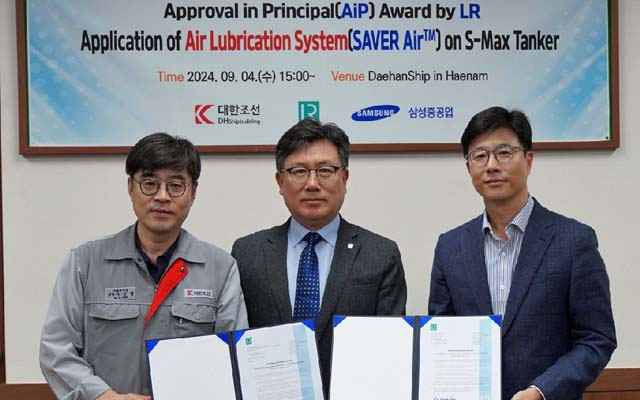Korea Shipbuilding reports that it has successively obtained eco-friendly ship technology certifications from global shipping companies and is accelerating its development of decarbonised ships.
Korea Shipbuilding has recently obtained Joint Development (JDP) certification for an ammonia dual-fuel propulsion Suezmax-class crude oil carrier from Lloyd’s Register (LR) and an LNG dual-fuel propulsion shuttle tanker conceptual design certification (AiP) from DNV. The AIP) procedure verifies the conformity of the design concept and content of the target vessel.
Since September 2023, Korea Shipbuilding has been conducting industry-academia joint research with LR to develop technology for next-generation eco-friendly ammonia-fuelled ships. The target date is expected to be the first quarter of 2025. In this study, Korea Shipbuilding succeeded in reducing fuel efficiency by about 4% compared to existing designs by applying Samsung Heavy Industries’ air lubrication system (ALS) ‘Saver Air’. The ALS creates a layer of air on the bottom surface of the hull to reduce frictional resistance during ship propulsion.
The ammonia dual-fuel propulsion vessel is an eco-friendly vessel that considers the safety design of the ammonia fuel supply, storage, and supply system so that marine fuel and ammonia fuel can be used together. Ammonia is attracting attention as a next-generation eco-friendly marine fuel because it does not emit carbon.
In addition, Korea Shipbuilding has obtained AiP from DNV for shuttle tankers with LNG dual-fuel propulsion technology. Korea Shipbuilding delivered its first shuttle tanker in 2022, and in February 2024 it received an order for three shuttle tankers, proving its technological abilities in the field of shuttle tanker construction to the global market.
There are currently about 70 shuttle tankers in operation, and taking into account the replacement of old ships due to the tightening of environmental regulations, the number of orders for about 50 vessels is expected to increase by 2030.
Additionally, Korea Shipbuilding has obtained AIP for applying Onboard Carbon Capture and Storage (OCCS) technology developed in Panasia to a Suezmax-class crude oil carrier. Since January 2024, Korea Shipbuilding has been involved in a JDP for an eco-friendly ammonia-fuelled vessel with DNV.
Lee Sang-chul, head of Technology Division, Korea Shipbuilding said: “In order to respond to the ‘2050 Net Zero’ proposed by the IMO, we will secure not only ammonia and LNG-fuelled propulsion ships, but also element technologies such as carbon capture storage and biofuels step by step. At the same time, we will continue industry-academia-government cooperation for win-win growth with the local community.”
Image: From left, Lee Sang-chul, Korea Shipbuilding; Kim Young-doo, LR; Byung-so Yoon, Samsung Heavy Industries (source: Korea Shipbuilding)



